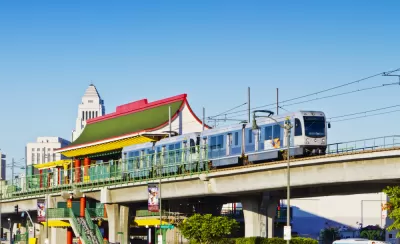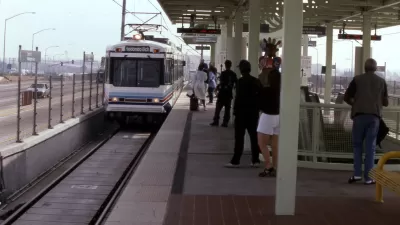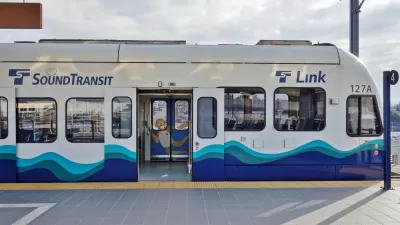President Trump points to the passage of multi-billion ballot measures last November as proof that federal funding isn't needed to fund transit, justifying elimination of a major grants program. The CEOs of two large transit agencies fight back.

To the chagrin of transit agencies, their passengers, and the transit industry, President Trump's Fiscal Year 2018 Budget [pdf], released May 23 by the Office of Management and Budget, an arm of the Trump White House, "limit[s] funding for the Federal Transit Administration's Capital Investment Program (New Starts) to projects with existing full funding grant agreements only."
To add insult to injury, transit agencies that have successfully sought voter approval last November to raise taxes and fees to support funding for new projects find themselves cited by President Trump as proof that seeking federal funding for transit projects is unnecessary and even unwise.
"Several major metropolitan regions have recently passed multi-billion dollar revenue measures to fund transit projects, and the Administration believes that is the most appropriate way to fund transit expansion and maintenance," states the document at the beginning of the Department of Transportation section on pg. 76.
Several major metropolitan areas, including Denver, Los Angeles, and Seattle, have already begun to move in this direction by asking residents to approve multi-billion dollar bond measures to speed the delivery of highway and transit investments. These regions realize waiting for Federal grant funding is not the most efficient way to meet their local transportation needs.
To this correspondent, it appears that President Trump and Transportation Secretary Elaine Chao have been drinking the Heritage Foundation's Kool-Aid on devolution: "what many conservatives want today—eliminating the role of the federal government [in transportation] and turning it over to the states," notes Planetizen's first post on Chao, who served as a distinguished fellow at the conservative foundation.
The administration's position on use of federal funds is the same as its approach to the yet-to-be-released $1 trillion infrastructure plan: "Federal resources should be focused on making targeted investments that can leverage private sector investment and incentivize the creation of revenue streams where possible,” states the document.
Response
The chief executive officers of Sound Transit and Los Angeles County Metropolitan Transportation Authority (Metro) teamed-up to respond in a joint press release.
"The administration's assertion that our regions can deliver transit solutions for our citizens without federal partnership is uninformed, misguided, and unfair," state Sound Transit CEO Peter Rogoff and Los Angeles Metro CEO Phillip A. Washington.
"The voters of our communities stepped up and voted to tax themselves to provide a path out of punishing congestion. For that bold action, they should be rewarded at the federal level, not punished....
"This wrong-headed budget proposal ignores the will of our local voters and the real-world challenges we are facing in our rapidly growing cities."
Puget Sound
The major project affected by the elimination of the Capital Investment Grant Program in the president's FY 2018 budget is the federal government's $1.17 billion commitment to Sound Transit's Lynnwood Link Extension which calls for extending light-rail service 8.5 miles from Northgate Mall in Seattle to Lynnwood, Wash. Thanks to Congress, Sound Transit received $100 million in what was meant to be an initial, not final installment.
"The voters of Puget Sound have already voted [in 2008] to tax themselves for the local share to make these projects happen," adds Rogoff. "They now have the right to expect a reasonable return on their federal taxes to also address these critical regional needs."
Mike Lindblom, Seattle Times transportation reporter, writes that the Trump budget wipes out half the budget for the Northgate to Lynnwood extension.
That corridor, scheduled to open in 2023, is under final engineering and was previously recommended to receive the money from the Federal Transit Administration...but lacks a completed grant contract with FTA.
Last November, voters in three-county Puget Sound area passed Proposition 1, composed of three tax increases that will raise $27.7 billion through 2041 to fund the $53.8 billion Sound Transit 3 plan (ST3). "Seven future transit lines in Washington ... could lose their anticipated federal funding under the president’s budget proposal," reported Lindblom on March 18.
Los Angeles
"The issue for Metro is that the White House budget proposal released earlier this week does not include federal funding for section three of the Purple Line Extension subway between Century City and Westwood," home of the University of California, Los Angeles (UCLA), writes Steve Hymon of The Source in an introduction to the press release. "Metro needs a federal grant to pair with local funds to build that third section." Last January, the second phase to downtown Beverly Hills and Century City received almost $1.6 billion in federal grants and loans.
"In contrast to the administration's contention that Metro believes federal funds are inefficient, we, in fact, find federal funds essential to our local success in raising funds for critical national transportation needs," states Metro CEO Washington.
Measure M in last November's election will raise a whopping $120 billion in 40 years from the approval of two half-cent sales tax ballot measures. Washington continues:
"Our local tax proposal, Measure M, accelerated the Purple Line Extension by requiring a significant local share from the county's taxpayers AND a federally funded portion...In this manner, the federal funds serve a critical 'leveraging' role in the funding proposal package.
"If the goal of this administration is to build out and repair our crumbling national infrastructure, these proposed cuts will do the opposite. And we plan to fight vigorously through our congressional delegation to see that the cuts are eliminated from the budget."
As Washington indicates, Congress will have the final say on the budget.
The Federal Transit Administration's Proposed Allocation of Funds for Fiscal Year 2018: Capital Investment Grant Program (New Starts, Core Capacity and Small Starts) is available here.

Maui's Vacation Rental Debate Turns Ugly
Verbal attacks, misinformation campaigns and fistfights plague a high-stakes debate to convert thousands of vacation rentals into long-term housing.

Planetizen Federal Action Tracker
A weekly monitor of how Trump’s orders and actions are impacting planners and planning in America.

In Urban Planning, AI Prompting Could be the New Design Thinking
Creativity has long been key to great urban design. What if we see AI as our new creative partner?

King County Supportive Housing Program Offers Hope for Unhoused Residents
The county is taking a ‘Housing First’ approach that prioritizes getting people into housing, then offering wraparound supportive services.

Researchers Use AI to Get Clearer Picture of US Housing
Analysts are using artificial intelligence to supercharge their research by allowing them to comb through data faster. Though these AI tools can be error prone, they save time and housing researchers are optimistic about the future.

Making Shared Micromobility More Inclusive
Cities and shared mobility system operators can do more to include people with disabilities in planning and operations, per a new report.
Urban Design for Planners 1: Software Tools
This six-course series explores essential urban design concepts using open source software and equips planners with the tools they need to participate fully in the urban design process.
Planning for Universal Design
Learn the tools for implementing Universal Design in planning regulations.
planning NEXT
Appalachian Highlands Housing Partners
Mpact (founded as Rail~Volution)
City of Camden Redevelopment Agency
City of Astoria
City of Portland
City of Laramie





























